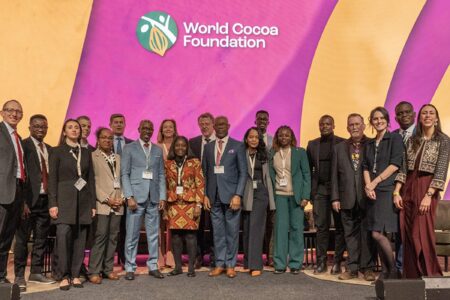Cargill’s Sustainability Report reveals key measures to support global farmers

Enhancements to Cargill’s cocoa harvesting processes in adopting barcoded cocoa bags and digital (CMS) systems, mean 50 percent of sustainable beans in the global direct supply chain are now traceable from farm-to-factory.
This is just one of the company’s key developments revealed in its Cargill Cocoa & Chocolate 2018-2019 Sustainability Progress Report, which sets out to support farmers in key producing territories in Brazil, Cameroon, Ivory Coast and Ghana and Indonesia.
According to the company’s latest publication, between 2018-2019, 151,190 metric tonnes of cocoa beans were tracked (up from 35% the previous year). The CMS enables farmers organisations to manage loans, collect beans and check fixed versus variable costs.
”This sustainability progress report highlights how Cargill uses technology to connect every dot in the cocoa supply chain. Maximum transparency in the cocoa sector is critical for making real progress on sustainability. It not only helps cocoa farmers, their families and communities prosper, but also helps protect our planet. I am confident that working with our partners we can continue to make great strides in achieving a thriving cocoa sector,” said Harold Poelma, president of Cargill Cocoa & Chocolate.
As identified in the report, starting in 2018-2019, all farmer organisations in the direct sourcing network in Ghana and Ivory Coast are reportedly now visible through an interactive Cargill Cocoa Promise Sourcing Partner Network map, linked to its Cocoa Promise scheme Each of these farmer organisations benefit from Cargill Cocoa Promise programmes, which have been working towards sustainability goals over the past eight years.
Through these schemes, the company has offered technology such as mobile money, GPS mapping and digital data collection, which allow for greater transparency on how cocoa is grown and sourced from farmers.
Among the company’s other key milestones covered in the report period are implementation of child labor monitoring and remediation systems (CLMRS)
to address child labor has significantly increased. In addition to Ivory Coast, Cargill added that it also deploys CLMRS now in Ghana and Cameroon, reaching a total of 58,800 farmers in 2018-2019. This extends the reach from 7 percent to 29 percent of the total number of farms in the direct supply chain.
Furthermore, in 2018-2019, Cargill also conducted a needs assessment for programs to address child labor in cocoa growing communities in Indonesia; a localized approach to CLRMS will follow in 2020.
Another notable development is that of GPS polygon mapping of 72 percent of all farmers in the direct supply chain, representing over 400,000 hectares of farmland, was completed. As the business noted, it is on track to identify which areas may be at risk of deforestation and how to mitigate this risk through specific interventions.
Support services
Digital tools are providing cooperatives and cocoa farmers with information, such as digital farm development plans and market insights, to help improve their farming practices. In addition, the digital tools serve as a means to communicate with farmers during a crisis, such as the coronavirus pandemic. Cargill’s digital farming tool is amplifying government safety and sanitation messages to help curb the spread of the virus in farming communities. Voice messaging is also used to reach ten thousand farmers with this information in a variety of local languages.
Cargill said it sees digitisation driving change across the entire cocoa supply chain. Utilising the valuable information that is collected will inform on how to achieve the best impact on the ground. For this we developed an extensive data platform that has more than 300 data points along the supply chain. It also uses this data to inform its customers through an interactive customer portal about how collaborative sustainability programs are benefiting farmers and their communities.
• I




Very Helpful and Informative post.
Thank you Robert!